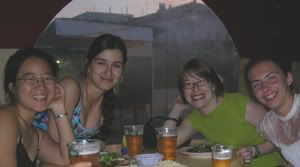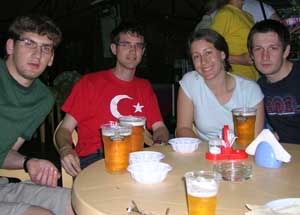Thanksgiving (or, to be more accurate, the Saturday after Thanksgiving, when Turkey Day was celebrated in the AH), was a long but fun day. I arrived around ten to find M and K both already up to their elbows in turkey (as K says). They were indeed stuffing four turkeys (imported from Moscow), as Gosha looked on eagerly. (I gave the poor kitty a turkey-heart in order to placate him, although I think all it did was whet his appetite. He was rather beside himself all day, what with the smell of turkey in the air.) I must admit that I did very little as far as the actual cooking. I made corn, which came out of a can... but hey, each to his own skill level. But I did help with the cleaning and the setting up and the running to the store and the looking up of ounces to grams and baking soda to baking powder conversions on the internet. Despite the rather terrifyingly uncooperative oven (which burnt what should have been our gravy out from around the turkeys, necessitating the need to remove the batteries from the fire alarms), the turkeys and all the trimmings turned out to be delicious, delicious, delicious. It didn't taste quite like home-cooked, American Thanksgiving fare, simply because a lot of the ingredients were Russian, but it was close enough. The dinner was a fantabulous success, which fed close to thirty people until they were stuffed. Turkey, stuffing, cranberry sauce (made by Y from fresh cranberries), corn, mashed potatoes, glazed carrots, [insert a brief pre-dessert musical performance by Male B and J], apple crisp, brownies and fresh-baked chocolate chip cookies... We were, as one is supposed to be on Thanksgiving, stuffed to the point of immobility. Then we got to clean up the remains of the dinner-for-thirty. Sigh. Following that, the Americans, as well as Galya and Alexei descended to the AH basement for a few rounds of Russian karaoke, before we all stumbled home for a nice tryptophan-induced sleep.
Sunday, I slept until almost noon. I take great joy from sleep. Anyway, after a quick stop at the AH (ostensibly to plan lessons, but in reality to check my email), B, Y, J, M and I met up with L, who took us to her home out to Dobroye (the "suburbs" of Vladimir, where the ice-skating rink is located) for an Azerbaijani feast, prepared by her mother (L's mother is from Azerbaijan). We had deliciously spicy plov (a rice dish) and dolma (stuffed grape leaves) in a rich and yummy sauce. Spicy food!! L's Mom was the hero of the day.
Following our second feast in as many days, we watched the most beautiful and wonderful movie in the world: the French film, Amelie. If you have not seen this film, you need to do so. It was so incredibly perfect and made me feel all warm and fuzzy. (I would have called it incredibly perfect if it hadn't had a Ghost Train... but the addition of a GT into the tale simply made the film perfect in the surreal way that Ghost World was perfect, although this movie was far happier. Not that being happier didn't mean it didn't cause a twinge or more of sadness, but...)
Changing topics entirely: Posters such as the one below are plastered all over the city. For those of you who don't read any Russian, this poster advertises an upcoming musical-theater show called "Shrek and the Heroes of Disney" (featuring, among other things, "giant puppets" and a "grandiose laser show"). How many things can you find wrong with this? I'm guessing you're smart enough to figure it out on your own.
And lastly, yes, another book review. A few days ago, I finished reading The Russian Debutante's Handbook, by Gary Shteyngart. It took me a while to decide whether or not I would write about it, and obviously I came to the decision that yes, I would. This book was recommended to me by my coworker, M. The first thing that I noticed was that the first eight pages of the book consisted of lengthy and glowing reviews. I admit that this kind of turned me off. Does a genuinely good book really need to have eight pages touting its goodness? Or can the reader simply find out for himself? Anyhow, TRDH is the tale of one Vladimir Girshkin, a Russian Jew who immigrated to the United States as a child, and who returns to Eastern Europe halfway through the book. As M moved to the US as a child (from Ukraine) and is currently embarking on his first trip back to Eastern Europe, I can certainly see how he might understand Vladimir Girshkin on a level which I simply cannot. The book was interesting, and it did hold my attention, although my level of incredulity rose at the turn of every page. A lot of the tale takes place in a fictional Eastern European country; I'm fine with that (someone who loves fantasies and who recently waxed ecstatic over Wicked is obviously not going to scoff at a fictional country). The places were wholly believable. The characters (to me) were not. As the plot followed its arc, the main character somehow changed from a shy, bumbling, socially-awkward, self-conscious fellow into a high-powered gangster. To me it didn't make sense. I cannot at all understand how the Vladimir of the first half of the tale became the Vladimir of the second half of the tale. And to be honest, neither Vlad appealed to me as a person; he was rather an ass, and not someone I could find an affinity with. I also kind of think this book is to blame for the fact that so many people, upon hearing that I was moving to Russia, asked in all seriousness, "But aren't you worried about the mafia?" Has anyone else read this book? Obviously, many people (M included) have read and loved it, as it's a "national bestseller" and a "New York Times Notable Book," in addition to those eight pages of glowing reviews... If you've read it, let me know; I'm looking forward to your opinions.


